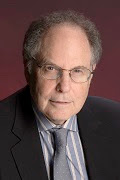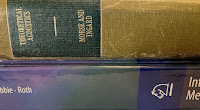Today I want to talk to high school students who, when they attend college, might be majoring in
biological physics. What does a biological physics major look like? Below I present my vision of a biological physics curriculum.
Foundational Courses
Mathematics
Chemistry
Biology
Physics
These are the core introductory courses that you absolutely must take. The physics class should be calculus-based. All the science classes need to have a laboratory component (whether as part of the introductory class or as a separate laboratory class to be taken concurrently with the lecture course). In a four-year undergraduate career, these classes represent one course per semester. You’ll probably take most of them in your freshman and sophomore years, because they’ll be prerequisites for more advanced courses. These foundational courses are required for just about any science or
engineering major (including premed); if unsure what you want to study you can take them first and then decide your major
once you know what you like best.
Some high school students will have advanced placement credits for many of these classes, which is great, but it’s alright if you don’t. I’ll assume, however, that you’re ready to take calculus the first semester of your freshman year. The best thing you can do in high school to prepare for a biological physics major is to take enough math that you are ready for calculus on day one.
Advanced Courses
Mathematics
- Multivariable Calculus
- Differential Equations
Chemistry
- Organic Chemistry
- Biochemistry
Biology
Physics
- Modern Physics
- Thermodynamics
- Electricity and Magnetism
Ideally you would take all these advanced courses, but there may be too many for that. Students coming in with advanced placement credits might be able to skip the introductory classes and take these instead. Some universities teach Biochemistry in the chemistry department, and some in the biology department. It doesn’t matter, take one. Many schools offer a two-semester sequence of Organic Chemistry. That would be okay, but it’s probably more Organic than you’ll need. In fact, if pressed for time you might skip Organic altogether, assuming you can still enroll in Biochemistry (which is essential) without needing Organic as a prerequisite. There are many biology classes you could add to this list, but I have included only the one I think is crucial: Physiology.
If your school is like Oakland University, where I taught, you can take Modern Physics, which is basically a third semester of introductory physics with emphasis on modern topics (relativity, quantum mechanics, nuclear physics). If your school doesn’t have such a course, you could just take the physics department’s Quantum Mechanics class instead. I put E&M on my list because I think it’s the ultimate undergraduate physics course (and my favorite). I’ve noticed that other schools offering biological physics or biophysics curricula sometimes don’t include Electricity and Magnetism. I guess if you can’t cram all these advanced courses into four years and you have to skip something, consider skipping E&M.
Electives
Mathematics
- Linear Algebra
- Probability and Statistics
Chemistry
Biology
- Genetics
- Molecular Biology
- Cell Biology
- Anatomy
Physics
- Nuclear Physics
- Optics
- Advanced Laboratory
I doubt you’ll have time for many of these electives. I believe your undergrad years are a time for getting a liberal education, so I would favor non-science electives over taking all these optional science courses. For example, be sure to take whatever classes are necessary to learn to write well. The Probability and Statistics course is higher priority than Linear Algebra. Don’t bother with Physical Chemistry unless you somehow got through all your physics courses without learning any quantum mechanics. I would load up on the elective biology classes only if you really love biology (you want to study BIOLOGICAL physics, not biological PHYSICS). The most important biology class in the list is, in my opinion, Anatomy. Nuclear Physics is useful if your interests lean toward medical physics; Optics if your interests tend toward biomedical engineering. If you plan on being an experimentalist, an Advanced Laboratory is valuable.
For you readers who think I’m missing an essential class, or believe some of my recommendations are not needed, add your opinions to the comments section below. I’m sure readers would benefit from other points of view.

Specialty Courses
-
Intermediate Physics for Medicine and Biology 1
- Intermediate Physics for Medicine and Biology 2
I may have a vested interest here, but I think a two-semester sequence based on Intermediate Physics for Medicine and Biology should be mandatory. There are some topics in courses like these that are often not covered in other science classes, such as fluid dynamics, diffusion, feedback, and tomography. Not all universities offer such courses. In that case, you might have to take them via independent study, or just do some outside reading. Okay, if you must you can use some other textbook (but you’ll break my heart).
Any faculty thinking of starting a biological physics major should note that these two specialty courses are the only classes that probably don’t already exist at your institution. The vast majority of the courses I list are already being taught at most colleges and universities.
Capstone Courses
-
Colloquium
- Independent Research
If your physics department has a colloquium course take it, at least during your senior year. If not, just attend regularly any research seminars hosted by your physics, chemistry, or biology departments (sometimes these events have free food!). I encourage you to do undergraduate research, even if it means you take fewer advanced courses and electives. My undergraduate research experience was more valuable than any class I ever took.
If your school has few research opportunities, search for a National Science Foundation-supported REU (Research Experience for Undergraduates).
Some students may be attending a college that has no biological physics or biophysics major. In that case, you will just have to adjust this list as best you can to fit your situation. Be flexible. If you have some oddball class that you love, or that is being taught by an outstanding and beloved instructor, don’t hesitate to substitute it for one of the courses on this list. Remember, it’s your education, so do as you want.
I hope this helps you high school students as you plan your college experience. Good luck!
























